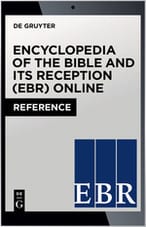The Importance of Bible Reception: An Interview with Benjamin Wright III
Why does Bible reception matter? We asked Benjamin Wright, scholar of Ancient Judaism and editor of the Encyclopedia of the Bible and its Reception (EBR).
This is the fifth part of an interview series dedicated to the EBR (Encyclopedia of the Bible and Its Reception Online). EBR is a research tool for scholars in biblical studies and related fields
Could you please introduce yourself? What are your areas of research?
Hi, I’m Ben Wright and I’m the area editor for Second Temple and Hellenistic Judaism. My research areas are in Ancient Judaism, in general, from about the time of Alexander the Great through the first century CE. I work on Ancient Jewish wisdom literature, on the Dead Sea Scrolls and on Greek Hellenistic Jewish texts in Egypt. I think about those pieces of literature and how they help us reconstruct what ancient Judaism looked like in all its variety in the ancient world.
How has your role as an editor for the Encyclopedia of the Bible and its Reception (EBR) helped you advance in your own research?
Well, as an editor I read everything that everybody writes, which means that I’m learning from all sorts of people who are experts in different areas from mine. From that standpoint, the project itself has helped me as a scholar. But also to take that research and translate it into ways that users of EBR will find helpful has also been interesting and is sometimes a little bit of a challenge. To figure out who our audience is and where they are going to look for information and then to take that specialized knowledge and make it more generally available to them. Since the audience will be varied, scholars on the one hand but also laypeople and students on the other, walking that thin line is especially interesting and challenging as an editor.
What are your tasks as an editor for the Encyclopedia of the Bible and its Reception?
My task is really, from the beginning, to determine what we’re going to write about, how long it’s going to be, to find people to write on those particular topics. And when they’re finished writing about those topics to edit the articles and to shepherd them through to the next stage so that we can get them published in the encyclopedia.
Do you use EBR yourself?
EBR is incredibly helpful on a whole range of topics. I use it myself in my research so that I can find out things about areas that I don’t know. Even outside of Second Temple Judaism, for instance, if I’m working on the late first century, or the second century, I’m going to be looking at the articles on Rabbinic literature. For my students, who are all undergraduates working on more broad topics, I can refer them to articles on literature, on film, on the visual arts. There’s a huge range of material that my students can take advantage of. For instance, one of the things I’ve just done with my students is we’ve watched the movie
“I think that reception history – how the Bible gets read over the course of its history – is a really important area that often gets ignored.”
How has working with the other editors been?
It’s a large team of editors, and it’s been interesting because even among the Judaism editors, there are different people with very different areas of expertise. I start with the earliest period, with Second Temple Judaism – the Hebrew Bible itself is a separate area – but Rabbinics, Medieval, Modern Judaism are all in my group. For example, there is a lot of information on Modern Judaism I don’t really know much about because it’s just not my specialty. So even within our own Judaism group I’ve gotten to know scholars with very different expertises. But my work also helps me maintain connections with people who write on early Christianity or the New Testament. We have all these overlaps with the Hebrew Bible group as well. So there’s a broad spectrum of people that I’ve been able to get to know and think and talk with.
What about working with De Gruyter?
De Gruyter has been incredible. The responses that we get as editors from the team in Berlin have been really stellar for me and incredibly helpful. I’ve never had an issue with people getting right back to me. In any project of this size there’ll be glitches and obstacles and especially at the user end it has been helpful to know that there’s a team in Berlin responsible for those issues who are working to make the process smoother all the time. It’s one of the reasons for me that I can continue on a project of this sort, because those people are trying to make my life easier to do this job all the time.
Why do you think the reception of the Bible is an important topic?
I’m a huge fan of EBR simply because I think that reception history – how the Bible gets read over the course of its history – is a really important area that often gets ignored. When I think about my students, they go back and read a Biblical text, and they think the way that they read the text is exactly the way that ancient people read it. The encyclopedia is a great resource for showing them that the things they think the Bible says may be things that medieval Christians or Jews thought the Bible says, but certainly not ancient people. So from that standpoint, the importance of the encyclopedia is that it contains information on the different ways of thinking about the Bible and how it has been read from antiquity to modernity. This perspective is critically important for me and for my teaching, and for my students it has been really helpful.
